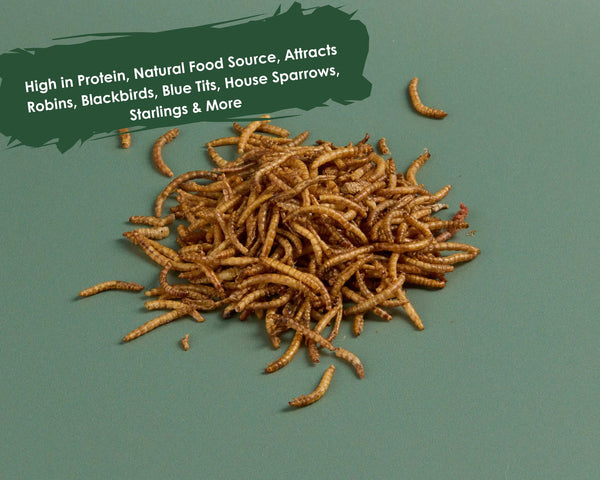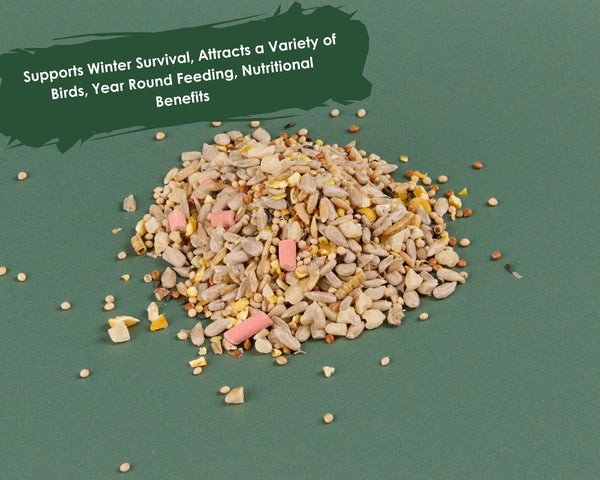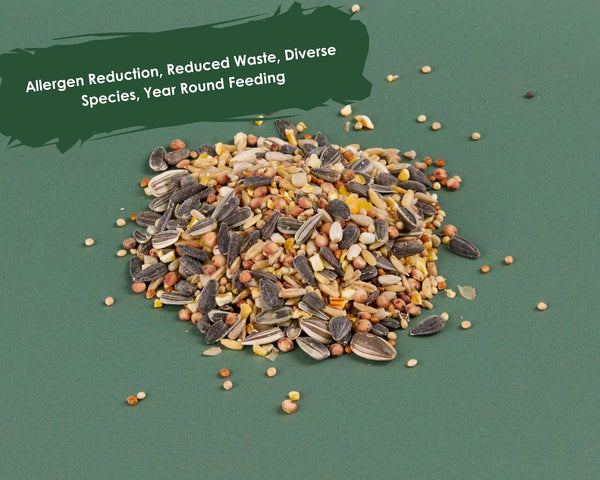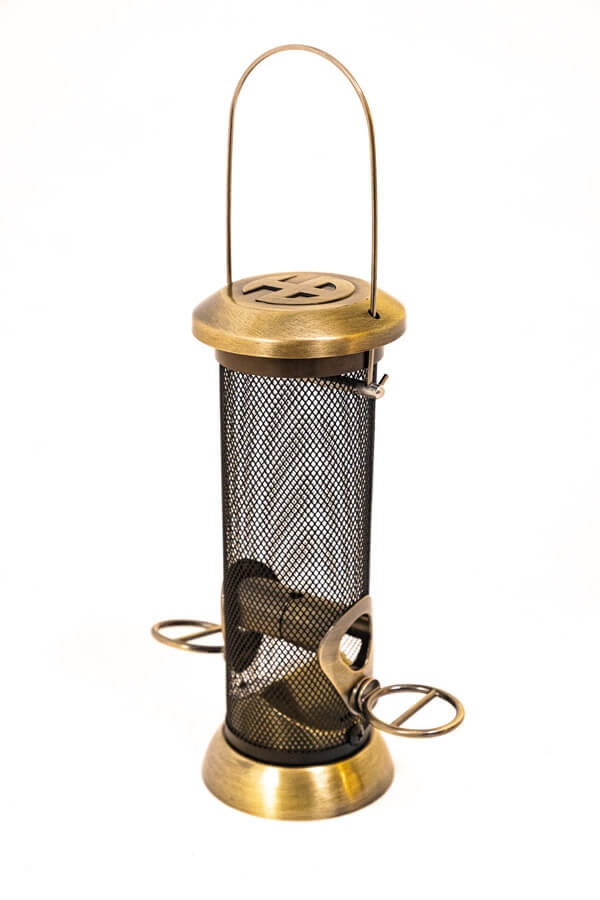Bird Watching For Beginners - It Doesn’t Have To Be Hawkward
As a beginner, it can be a little tricky to know the best way to start bird watching. There's no shame in that - it's a huge, sprawling hobby, and knowing how to start in the right place can be tricky! In this article, we're going to go over the basics of every single element of bird watching, making sure that you know where and how to start.
Whether you're keen on buying some fancy binoculars or you're content with the naked eye for a little while, we're happy to run through some great options available to you.
British Garden Birds are fascinating, and we know you'll love this article.
Watch Birds
Realistically, the best way for you to get started is for you to get up and start. This is a little easier said than done, but the truth of the matter is that birdwatching has a much lower barrier of entry than you might think. At the end of the day, what are you doing when you see pigeons going for your bird feeders? You're bird watching - the only different thing about starting bird watching as a hobby is doing it all intentionally.
So, with that in mind, we would suggest doing just that - going to a spot with plenty of trees, and maybe a small body of water, and intentionally bird watching for a little while. It likely won't start off too dramatically, but before long you'll be spotting obscure streaks in the sky with ease.
Try starting off at a local park or lake - waterfowl will always gather around people sitting at benches or standing at the edge of a lake. By throwing them some porridge oats, peas, or sweetcorn, you can encourage them to come a little closer. Before long, they'll be waddling back and forth around your feet, allowing you to get a good few of every single feather on their back.

British Birds
We're very lucky in Britain since there are so many birds on this small island. The nation's adoration for bird feeders has meant that a number of different species have sprung up all over the place, eager and excited to snack on some free food.
Perhaps the most iconic British bird is the robin - it's the unofficial bird of the British Isles, being found nearly everywhere, and almost all year round. The easiest time to see it is during January and February, though they will be around throughout the year - you might just have to look a little harder.

A great example, as we mentioned before, is the UK's wealth of waterfowl. From an enormous heron to a suite of tiny moorhens, they can all be found on lakes and stretches of water throughout the UK - try a few different natural and artificial lakes near you. Before long, we'd wager you'll have a favorite spot.
Living Birds
'Living birds' might sound like an odd phrase, but when paired with the phrase 'life list', it makes a little more sense. A life list is a list of species of birds that a birdwatcher would like to see during their time birdwatching. This list must include living birds, of course, as you'd have a particularly tough job tracking down a pack of dodos.
We'd recommend starting small with your life list - find a list of the most common birds in the UK, and write down some of the ones that you might like to see. It's very likely that you'll have already seen a robin or a bluetit, but you might not have seen a coot or wild owls. Creating a list of birds that are fairly common, but still a little rare will instill the desire to see each of the birds on your first life list.
Bird Watcher

A bird watcher is someone who watches birds, of course, though there are commonly misconceptions about what a bird watcher must be. A bird watcher doesn't necessarily have to be someone with an obsession to find the best bird in the land, and it doesn't have to be someone with a passion for conservation and recycling. Instead, a bird watcher can simply be someone that would like to visit some special places in England and beyond, and see some small parts of natural history.
Every hobby in the world has a reputation of one kind or another, and it's no lie that a hobby like birdwatching can have a slightly negative stigma around it. The truth of the matter is quite simple, however - it's most certainly not boring! In fact, it's one of the most varied and complex hobbies out there. Anyone can get started, and we'd actually say that most everyone should get started.
So, with that said, we might suggest heading out to a local park today - seize the desire in you while it's burning brightly! Finding a local park online has never been easier, as well as finding the opening times and the times that any facilities might be available to you. After you've found a great-looking park, walk into that little slice of nature, and get immersed in the birds that are out there. We're sure you'll find some great ones!
What is the word for bird watching?
There are a number of different words that might be used to describe birdwatching. The most common term is birding - heading out in search of different birds that might be out there. That term is often used both online and in real life to refer to birdwatching, and for an obvious reason - it's simple, concise, and to the point. Furthermore, it's expressly clear!

A much less obvious word that has been used for birdwatching is 'twitching'. It's a little unclear where the origin of this word started to refer to birdwatching, though the likeliest course of action started with a bird's tweet. During bird watching, you'll hear a lot of birds tweeting, of course. This meant that, for a while, bird watching could be referred to as tweeting, and people would happily understand what you mean. However, with the advent of Twitter, tweeting begin to mean something else - people with a passion for British birds were having their word co-opted for something else!
Instead, the word twitching was coined, as a slight corruption of the word tweeting, and has since taken quite nicely. It does sound a little odd when paired with a hobby as innocent and simple as bird watching, though that's perhaps the point - people that want to watch birds are a large group, and a portion of them will find the contrast between shifty-sounding 'twitching' and perfectly normal bird watching to be quite comedic.
What is the difference between birding and birdwatching?
There's actually no difference at all between bird watching and birding - the two terms are interchangeable ways to talk about the same hobby. Whether you're doing it in your garden or amongst the wildlife, the act of seeking out some interesting birds is precisely the same.
However, with that said, there's typically a little bit of a contrast between a birder and a bird watcher. A birder is likely much more interested and invested in the details of the hobby, nurturing a passion for ornithology that has them reeling off fascinating facts. On the other hand, a bird watcher is a little more likely to simply keep an eye out for the pretty and interesting birds - taking a more casual approach.
You, of course, decide your level of investment in the hobby. Whether you'd like to take it a little more or less seriously is entirely up to you - simply find a method that works for you, and find out about the interesting sphere that you've landed in.
Is bird watching good for you?
It's a little hard to definitely say that bird watching is or isn't good for you, since there are so many ways to do it. However, the general consensus is that bird watching will get you out of the house and into nature. As part of that, you'll likely interact with a few new people, and make some new friends. Whatever happens on your birdwatching adventures, meeting new people and making new friends is a great way to get a little mentally healthier. On top of that, going for some long walks in nature is a great way to increase your physical fitness, allowing you to get a little healthier in that way, too.

Is bird watching creepy?
Absolutely not, bird watching isn't creepy at all. This is a very odd phrase that people bandy around sometimes, and it's certainly not true. Bird watching is the practice of spending some time seeking out interesting new birds - learning new things and being a little more active. Whether you find herons or a handful of feathers, there's nothing creepy about bird watching.
Picking the right type of binoculars for your needs
If you're new to the world of bird watching, you might want to find some binoculars. Birds can be a far distance from you, and since they have a tendency to fly away from people, getting some great binoculars can be a wonderful way to see some distant birds in great detail.
While there are far too many specific ways to get the right pair of binoculars for us to cover here, there's one thing that we'd certainly encourage - avoid large online retailers like Amazon, and favor small, independent stores. The reason we suggest this is that small stores with birdwatching in mind will have specifically chosen a range of binoculars that they have been impressed by. With that in mind, it will be hard for you to get a bad pair of binoculars. Even if you do, small businesses have the best customer service, they'll be happy to help you out.

Where to find the most species?
The greatest variety of species will always be found in the greatest variety of ecological niches. This sounds a bit like a confusing word salad, but there's some truth to it - to find a wide range of species in one place, seeking out a spot with a range of niches in close proximity to one another is your best bet.
We would suggest seeking out a park or natural space near you that has both flowing and still water. For example, a park that contains both a stream and a lake. These two types of water nurture different types of plants and animals, resulting in different bird life near them, even if they're near one another. This means that, when birding, several overlapping niches make for valuable ground.
Desirable British birds
While you won't be trying to catch any of the birds that you see, there are likely certain birds a little more desirable than others. This might sound a little odd, but it's certainly the truth - a pigeon is a little less desirable than a swan, for example.
Perhaps the most desirable British birds that spring to mind are kingfishers. These small and rapid birds are almost never seen in the garden, sporting feathers in a range of colors from rust to teal. They're fast and beautifully streamlined, typically catching small fish out of streams and rivers. They're a beautiful bird, and there are a number of bird-watching enthusiasts that would certainly argue they're the best bird to spot in the UK. If nothing else, they're certainly one of the most eye-catching - they're utterly beautiful!

Birds in a local park
Wildlife near you is something that should be appreciated and sought out in equal measure. You're likely to be surprised by the birds that are in your local park.
To get the most out of parks local to you, we might suggest heading to the park earlier than most people would get there - that way, birds won't be scared off by crowds, and you'll likely see some sweet interactions in the treetops.
Location bird watching

There is some wonderful birding to be had throughout the UK. However, it may be worth finding some locations that you'd like to visit to find the best bird watching in the world for you. The Farne Islands are a common bird-watching destination, and they contain a range of fantastic birds.
Puffins are a common fixture of the Farne Islands, and their cute look and friendly demeanor mean that they're a favorite bird among bird lovers. A trip to the Farne Islands themselves doesn't have to be expensive and luxurious to be great for spotting birds, it merely has to be fun - consider a destination trip to find some of your favorite birds!
Conservation near you
There's every chance that, aside from your own garden and local parks, there are a range of great spots nearby for bird watching. We would suggest finding some spots locally that engage in intensive conservation since those types of spots are becoming more common.
Using resources from the Royal Society for the Protection of Birds (RSPB) can help you to find a great birding spot near you. Conservation efforts are often looking for volunteers, whether to pull weeds or to staff the visitor station and if you've got a little time, positions like those can be a great way to find new birds!
Making bird watching into a fully-fledged hobby
Making bird watching into a hobby for you doesn't have to be complex and costly - the most important thing is having fun. We would argue that the only thing required to make bird watching into a true hobby is to be intentional. If you can find the time to deliberately seek out birds and see what they're up to, then you're bird watching!
Chasing birds through their migration
This is another way to view destination bird watching, and it's a great way to get as much use out of your binoculars as possible.
A range of UK species migrate year round, and your favorite bird has every chance of being a migrating species. Online, you'll be able to find information about the migration patterns of your favorite bird, allowing you to see that creature at the destination and the origin of their migration season. Some birds stick to the British isles year round, meaning that you might not even have to go far to find a great bird spotting time.
Where to find great information
Great information on the birds in your garden and beyond can be found on the internet. Aside from anything that you can glean with your binoculars, we might suggest looking at the RSPB's site, since it has a fantastic range of information about British birds up for grabs. When bird watching, what's in your head is just as important as what's on the other end of your binoculars.
Attracting birds to your garden for bird watching
When sitting in your home, your garden is often the best spot to sit and see a great bird. This means that, when sitting with your binoculars, you'll have access to a range of beautiful and fascinating species. To attract more species to your garden, we would recommend offering a range of different bird food mixes, allowing you to engage in bird watching on a range of species.
There are a number of different seed mixes on the market, and they all contain more than enough different seeds to attract a wealth of great birds. Bird watching has never been easier! Try starting off with a high-protein seed mix that has some mealworms in it, which will result in some small, chubby, cute birds being on the business end of your binoculars.
Try to spot relationships between different birds
When you're looking through your binoculars and seeing birds interact, it can be interesting to see the relationships that different birds have. Whether you're birding in your garden or bird watching in the park, your binoculars can reveal a range of interesting secrets to you that you'll love.
A great example of this is being able to use your binoculars to see parents tending to chicks. In this case, binoculars will allow you to see the parts of the relationship that may not be seen as commonly - parents shielding their children from the cold wind, for example.
Binoculars have that in their favor, as well as something simple - they can allow you to do a little bird watching from your favorite bench, even if the nearest bird is a long way away.
We hope that this article has helped to convince you that there's nothing to fear about bird watching - whether armed with binoculars or not, you'll be able to easily seek out some fascinating creatures in no time at all!










